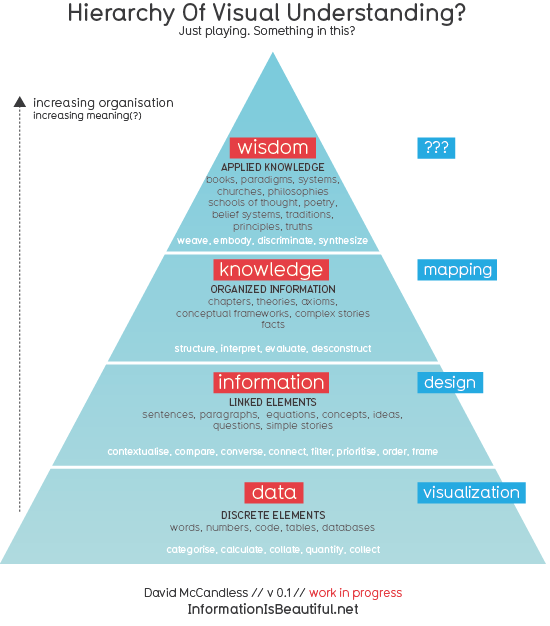If an idea is presented, and elements of it are questioned in a manner that parries but does not thrust, if it is purely surface, does this in fact have any merit as criticism? A criticism ideally has a purpose, which is basically to be a form of troubleshooting. It must be specific, it must engage with the topic. To not do this is equivalent to saying "well I haven't used the software you developed, but it's probably rubbish" (we might call this The Troll's Refrain). Stand back and ask how does this help us to actually improve the idea. Even thinking 'us' is useful, because if there's a conversation, then there is a joint effort. David McCandless (author of the excellent Information is Beautiful) has a useful breakdown of how we think about the world, in the following pyramid:
In this, there is a progressive hierarchy of whittling out what is irrelevant, the old effort of separating the wheat from the chaff. This means that the bottom is a field somewhere, and so the top is presumably a Weetabix. Ideas are about turning information into knowledge, they move us from one level to the next. The non-criticism I am thinking of above seeks to move us back down, from knowledge back to information, or data. Instead of information, it focuses on noise.
There is a temptation in all debate to ask for greater and greater precision, but at the same time you have to step back and ask what level of perfection you want. If ideas are to be abstract, then they of course cannot account for everything. What we are searching for is a degree of functional 'robustness'. This is a term which Kevin Kelly makes continuous reference to in his writing (I am mainly thinking about 1995's Out of Control, which has dated far less than I would have expected), denoting that capacity for enduring networks of communication to cope with unpredictability. It is a nice antidote to management horseshit about "best practice" because it factors into its very structure that we start from least worst, and go on from there. We trade off a small degree of efficiency for a considerably greater degree of structural toughness. There will ever be noise, but not every blip is a threat to the entire system. Ideas are supposed to be solutions, and they are not to be rejected on aesthetic grounds. If it works it works, and from there we can begin the work of making our solution elegant.

No comments:
Post a Comment